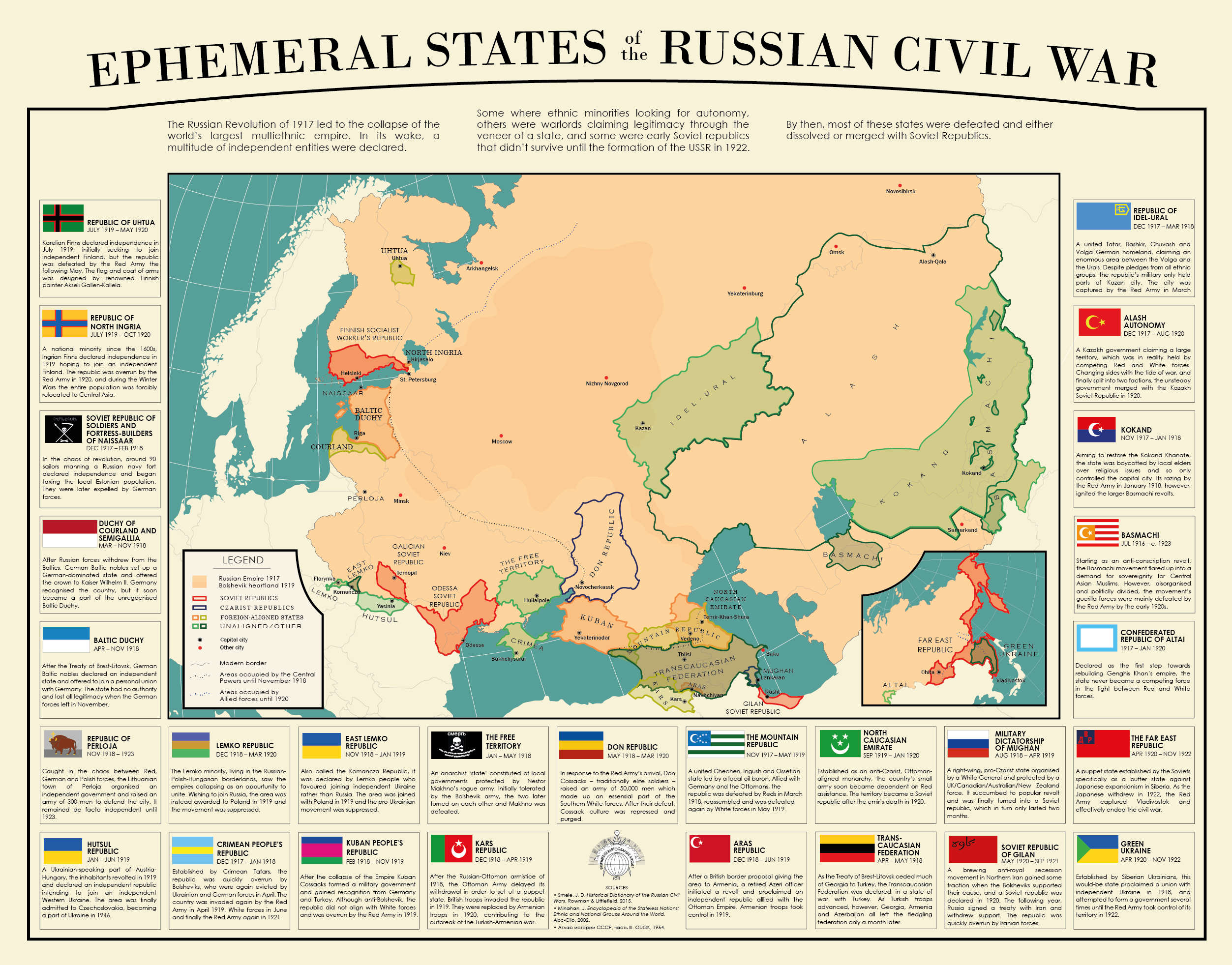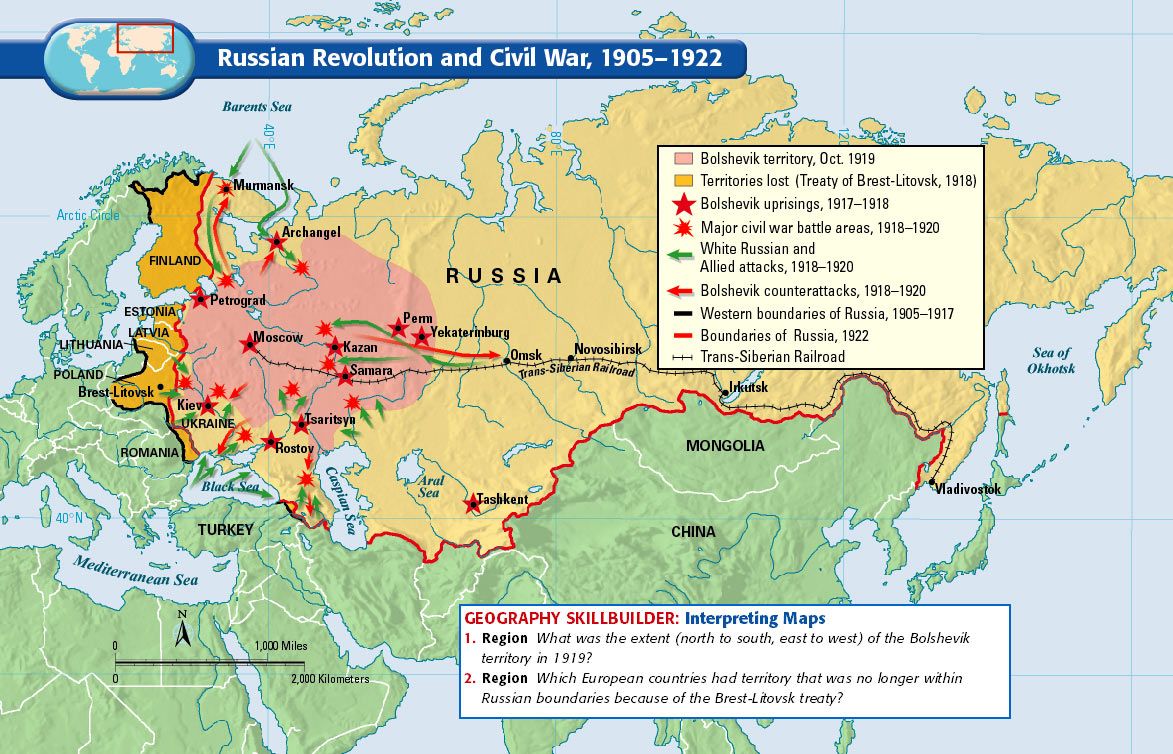To call the Russian Civil War complicated would be to grievously understate the matter. The shortest possible summary would be that it started out bad and only got worse.
This musical summary will draw on my own research on the anarchist Black Army of the Ukraine, particularly the career and life of Nestor Ivanovich Makhno. This means a focus largely on the Ukraine as well, since I'm pleased to announce I'm partnering with Sewer Rats productions to make a weekly seven part video series on Makhno that will be partially hosted on this site starting August 14th. So stay tuned, and subscribe below if you haven't already to stay up to date!
This particular post is not meant to be exhaustive or a detailed discography of the events from 1917-1922 that cost the lives of 1.5 million combatants and 8 million civilians (when one counts the attendant famine and diseases alongside the battles and purges).
For scale, the Holocaust a generation later is estimated to have cost the lives of around 6 million Jews and 11 million others.
The suffering of the former members of the Russian empire had just begun with the outbreak of the Russian Civil War (we haven't touched on the Holodomor or Stalin's purges, let alone WWII).
Let us get to the music.

In 1917, Alexander Kerenski formed an interim government of the Russian empire after the monarchy fell apart as part of years upon years of structural problems, incompetence, peasant uprisings (most famously the 1905 one) and a little thing called World War One. Prior to assuming, in his role as Minister of Justice, had tried to mollify the increasingly angry Russian population with some concessions to the popular will. One of these reforms, releasing all political prisoners from jail in March 1917, released our good friend Makhno from a life sentence at Byrtya prison in Moscow. Makhno made his way back to Ukraine, and we will join him when we are done with Kerenski.
Kerenski's interim government barely lasted from March to September of 1917. It had the rough features of a democracy, but even with material support from the Allies the government didn't last. The empire was still fighting a losing war against Germany and every province that thought it could get away from the Russian yoke did what they could to break free. A Finnish song from that era satirizes Kerenski's last days in office:
Kerenski's government fell. Lenin's Bolsheviks seized power in a violent coup in October and swiftly came to blows with every other faction, kicking off the Russian Civil war while technically still being involved in WWI.
A quick visual guide to the armies (CW: Swastika prominently displayed on the Altai independence movement's flag, if you wish to skip over it).

Again, we're speaking broadly here--the Russian civil war had so many theaters and everyone was fighting everyone. There were Siberian White armies, Red armies and even a determined bunch of guerrilla Black and Green armies that kept fighting past 1922.
Here's the cliff-notes to the major armies involved in the Russian Civil War and how they interacted:
-White Army: A mix of monarchists and the majority of old Imperial military staff who largely want to reform the shattering Russian empire under the old mold. While all of the armies engaged in pogroms, theft, conscription and rape, the White Army was particularly keen on anti-Semitic violence. Not surprising, since they wrapped themselves in the flag of Orthodox Christianity and monarchism. Just listen to their unofficial anthem, "Farewell of Slavianka", which I recommend doing with closed captions on.
-Red Army: Bolshevik armed forces and a political arm of the party as well. Maintained strength by conscription, as opposed to its original iteration, the Red Guard, which relied on volunteers. Reluctantly partnered with (and later betrayed) Makhno's Black Army against the Whites. Lenin made a disastrous (from a territorial point of view) deal with Germany to get Russia out of WWI so he could consolidate power and set about the grim business of terrorizing Russia into accepting Bolshevik rule.
Their anthem ("White Army, Black Baron") is typical of Bolshevik bombast: loud, catchy and full of braggadocio. Especially this cover, which shamelessly uses electric guitar, which was very much not a thing in 1920s Russia, no matter what the Bolsheviks tell you. I selected it because the quality was better than the other old recordings, which tend to be a bit scratchy. The lyrics are the same, at any rate.
"White Army, Black Baron" was a Red Army song referring to Pyotr Wrangel, the last formidable White Army general to pose an existential threat to Red and Black armies alike. Wrangel, confusingly, liked to dress all in black, which is the natural thing to do when you lead the White army and is referenced in this song. Part of the refrain, "The Red Army is the Strongest" later went on to become a Bolshevik song achieving peak popularity during WWII and the Cold War.
Wrangel was enough of a threat that the Red Army allied with Nestor Makhno's Black Army to try to stop him, which ultimately they did. Wrangel's White Army was beaten back and destroyed, leaving the Black and Red armies to fight each other. Amazingly, the White Army had the nerve to have an anthem WHINING about not being able to oppress, enslave and persecute at will, appropriately titled "All is Now Against Us" (1920).
The lyrics have to be seen to be believed. The Red Army committed countless atrocities in this conflict and many others during its existence, but to my knowledge at least they never had a fight song that was them whining about how they couldn't whip the peasants like the good old days.
-Black Army: The army of the Free Territory under Makhno was made up chiefly of Ukrainian peasants and deserters from the Red and White armies, and would sometimes cooperate with Green and Red armies. While most of it's leaders were staunch anarcho-communists, the rank and file ranged from opportunists (hardly in any short supply in the other armies listed above) to more libertarian-minded peasants who simply didn't want to be forced into collectivization as the Bolsheviks would have forced them to do, or serfdom as the Whites would have it.
Nestor Makhno was unique in that he personally shot troops who conducted pogroms, as opposed to the Whites (who practically made it their slogan) or Reds (who made little to no attempts to contain the worst impulses of their troops).
Without Makhno's daring last minute attack on Wrangel's supply line, preventing him from on capitalizing on his victories, the Bolsheviks would have been finished. Makhno wrote the Black Army's unofficial anthem, "Mother Anarchy Loves Her Sons" in 1919. It is less about ideology and more about killing those (Red or White) who would return people to slavery or state oppression.
-Green Armies: Peasant armies that sprung up more spontaneously than not to protect their possessions, lands, or simply not be victimized by the other armies. The most famous of them was the Green army of the Tambov Rebellion. Its members were so adept at the art of guerrilla warfare that the Bolsheviks chose to gas the forest they hid away in rather than put a toe inside it.
Once the White Army was defeated due to the efforts of the Black and Red armies, the Bolsheviks turned on the Black Army and destroyed it. They were similarly merciless to any sort of legitimate soviet (worker's council) movement demanding better conditions.
Ultimately, the Bolsheviks won the Russian Civil war.
Not content to simply crush political dissent, the Bolsheviks set about trying to co-opt anything associated with the anarchists, social revolutionaries or simply non-Bolshevik resistance to their rule that might work well for propaganda. This even extended to musical propaganda--take the song below. While it was written and first performed in 1937, it draw heavily on appropriated Black Army imagery, particularly the tachanka--a horse-drawn guncart that Makhno was credited with inventing. Certainly, while all sides used cavalry and tachanki in the Russian civil war, the Black Army was most famous for it. The Bolsheviks also pawned off their own crimes onto their record of Makhno, portraying him as a counter-revolutionary and pogromist (Makhno was ruthless with pogromists, making this charge baffling).
Makhno managed to escape from Ukraine and settled in Paris, where he set about writing his memoirs. He died in 1934 of illness. I couldn't find a date for this particular song about the death of Nestor Ivanovich, but its melancholy tune seems perfect to close us out of this particular topic.
